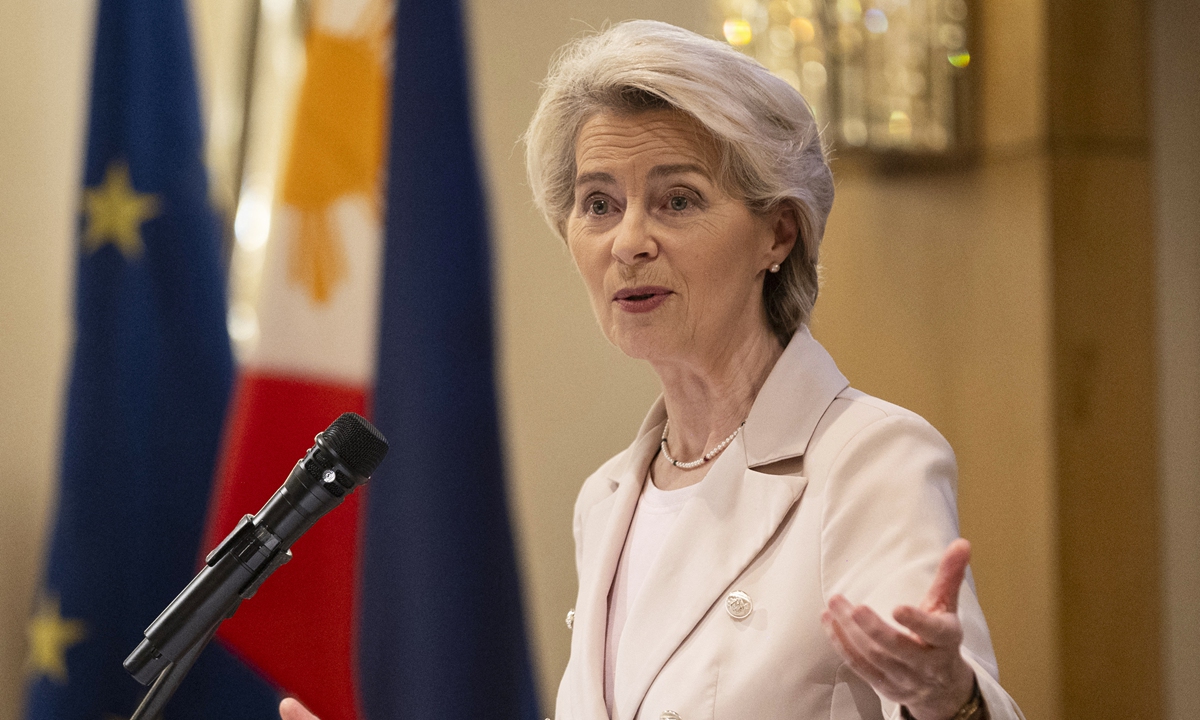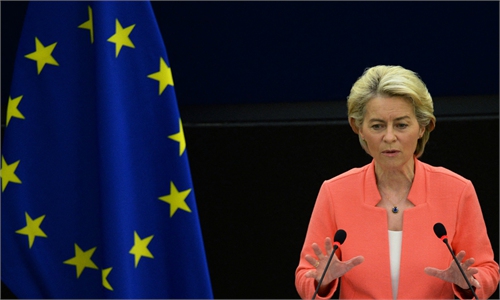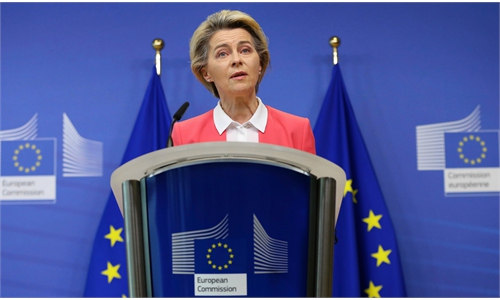
European Commission President Ursula von der Leyen speaks at a business event in Fairmont Hotel, in Makati on July 31, 2023.Photo: AFP
When Ursula von der Leyen became the first president of the European Commission to visit the Philippines, people were wondering how she would reinvigorate bilateral relations. Disappointingly, her Philippine tour is filled with provocative remarks on regional security affairs and the push for camp confrontation.
Von der Leyen started a two-day visit to Manila on Monday. The two sides announced the resumption of negotiations for a free trade agreement, and agreed to enhance cooperation on climate change, maritime security and green economy. It is supposed to be a positive news story since ties between the EU and the Philippines have been strained over the past years, mainly due to the Philippines' previous administration's war on drugs.
Yet part of von der Leyen's strong rhetoric raised some eyebrows. First, she said Europe would not tolerate aggression, "not in Ukraine, not in the Indo-Pacific," adding that security in Europe and security in the Indo-Pacific are "indivisible." Second, she said, "the EU underlines that the 2016 Award of the Arbitral Tribunal on the South China Sea is legally binding."
It is clear von der Leyen came with an aim at China. As one of the leaders from the EU, a supranational economic and political union, von der Leyen is deviating from the EU's original track. She seems to be "forging the EU into a military organization subordinate to the US," Song Zhongping, a Chinese military expert and TV commentator, told the Global Times.
It is hard not to associate von der Leyen's remarks with an attempt to apple polish the US and highly coordinate with the US' Indo-Pacific Strategy to contain China. When doing so, "von der Leyen simply sounds like Uncle Sam's parrot," Song added.
Security in Europe and security in the Indo-Pacific are two different things. There is no aggression or crisis in the Indo-Pacific region, let alone a crisis equivalent to the Russia-Ukraine conflict. Granted, maritime disputes exist, but they are generally under control given joint efforts from all regional countries, Li Kaisheng, vice president of Shanghai Institutes for Internaitonal Studies, told the Global Times.
In the past 40 years, Asia has been the most peaceful and stable region in the world, thanks to Asian countries' wisdom of peaceful coexistence. Nevertheless, "the West's constant interference in the region to stir up trouble and then exert strategic pressure on China is the root cause of potential crises here," Li said, adding that when von der Leyen said security in Europe and security in the Indo-Pacific are indivisible, she was trying to legitimize the EU's interference in Indo-Pacific security affairs. She is daydreaming, and such legitimacy does not exist.
In his second State of the Nation Address on July 24, Philippine President Ferdinand R. Marcos Jr did not mention the South China Sea issue. On the same day, Philippine Secretary of National Defense Gilbert Teodoro flatly rejected the idea of military cooperation with Taiwan island. Yet von der Leyen has travelled from half a world away to the region to hype up the South China Sea disputes, turning a blind eye to the fact that ASEAN countries, including the Philippines, do not want the South China Sea to become a hotbed of conflict and chaos.
It is ironic that von der Leyen herself has just accepted the World Peace and Freedom Award on behalf of the European Commission, an award which is sometimes referred to as the Nobel Prize of international law. Is she promoting world peace or exacerbating confrontation between camps? Is her goal to lead Europe toward unity and prosperity or to push the continent into more confrontation and division? Europe needs politicians who genuinely serve its interests and represent the true will of European countries. Von der Leyen is not one of them.


